NACE Journal, February 2019
What, if any, effect do internships have on the career readiness of first-generation students? Similarly, how do study abroad experiences impact first-generation students’ career readiness? In this article, we examine data from NACE’s 2018 Student Survey to compare and contrast the effects of these activities on first-generation students with those of their non-first-generation peers, detail implications, and suggest avenues for further investigation.
Diversity and First-Generation Students
First-generation (FG) college students, defined for purposes here as students whose parent(s) do not hold a bachelor’s degree, are more diverse racially and ethnically than their non-first-generation counterparts (NFG). (See Figure 1.)
The demographic breakdown of bachelor's-level students from NACE’s 2018 Student Survey follows this pattern, with FG students of diverse racial backgrounds outpacing their NFG counterparts. (See Figure 2.)
In addition to FG students being racially and ethnically diverse, socioeconomic status also distinguishes them from their NFG peers.
According to National Center for Education Statistics (NCES), 27 percent of FG students in 2002 came from households earning $20,000 or less annually, compared to 6 percent of NFG students, and 50 percent of FGs came from households earning $20,001 to $50,000, compared to 23 percent of NFGs.1 Not surprisingly, income plays a major role in whether to attend college: According to a report published by the Pell Institute, in 2016, 78 percent of high school graduates from the highest family income quartile enrolled in college, compared with 46 percent of those in the lowest income quartile.2 Additionally, a greater number of FG students take out student loans— and of higher values—in their first year of college than do NFG students.3
College-readiness also plays a role. According to one study, FG students who are not college-ready will drop out after their first year at a rate greater than equally un-college-ready NFGs.4 Another study found that only 20 percent of FG students earned their bachelor’s degree compared to 42 percent of NFG students.5
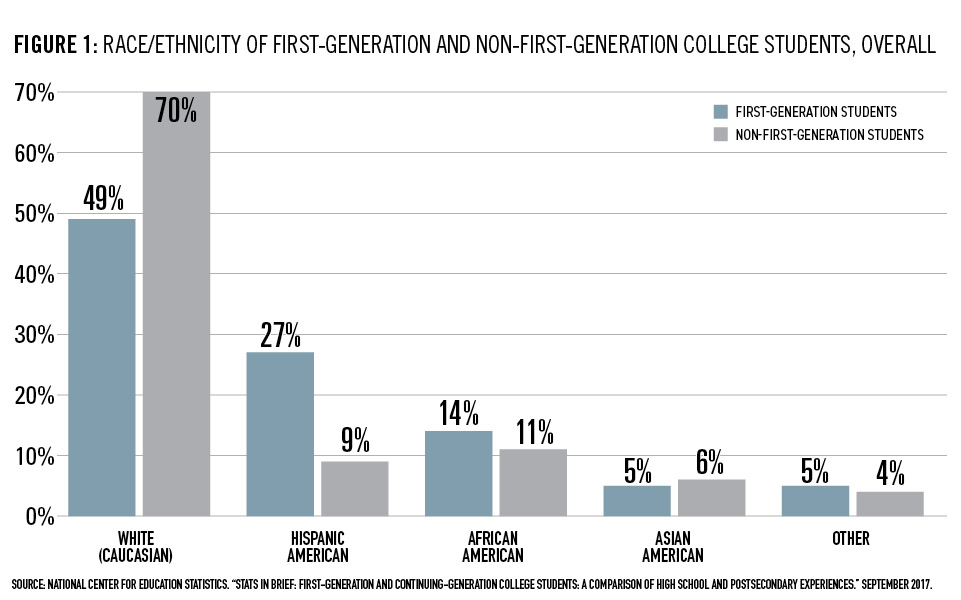
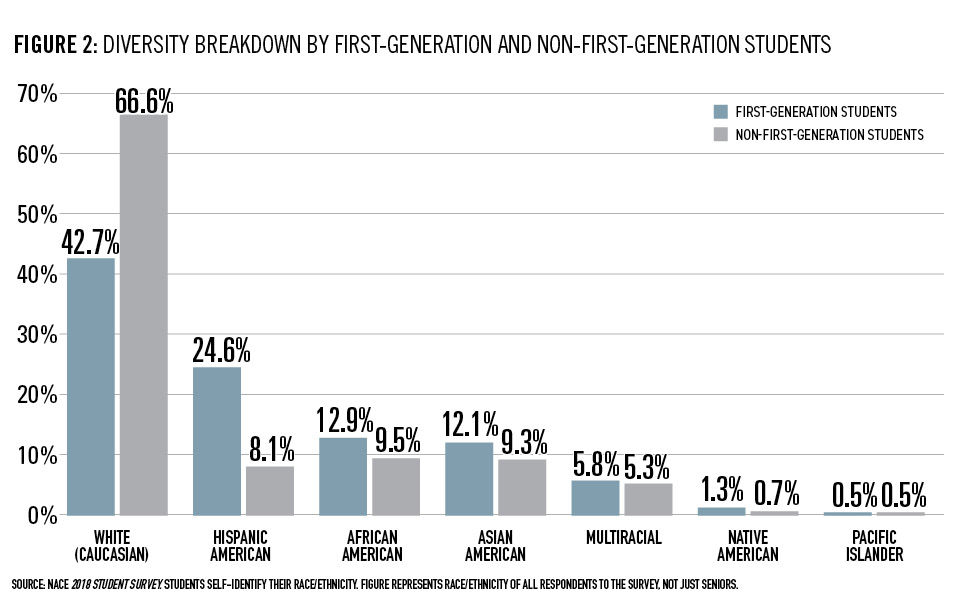
First-Generation Students and High-Impact Activities
With that backdrop, consider the difficulties many FG students have in navigating the college experience. How, then, do internship and study abroad experiences affect FG students? Do they positively impact FG students? Do FG students benefit more from taking part in internships and study abroad than their counterparts do?
A study published by the Association of American Colleges and Universities (AACU) found that the more high-impact activities FG students took part in—and both internships and study abroad were counted as such—the better. The study found that:
- FG students engaged in significantly fewer high-impact activities than did NFG students (an average of 1.24 versus 1.45).
- Reported levels of engagement in deep learning and perceived gains were, on average, 11 percent higher for FG students who took part in one to two high-impact activities compared to FG students who did not.
- The more high-impact activities that were participated in, the larger this distinction appears between the FG groups. Those FG students who took part in internships (+5.2) and study abroad (+4.3) fared better than FGs who did not take part.
NACE’s own research also sheds light on the value of these experiences.
First-Generation Students and Internships
Data from NACE’s annual Student Survey indicate that first-generation students are less likely to take part in internships than their NFG counterparts.
Overall, 45.7 percent of bachelor’s-level senior FG students responding to NACE’s 2018 Student Survey reported participating in an internship. In contrast, 52.9 percent of responding senior NFGs reported this. Similarly, results from the 2016 version of the survey shows that 53.5 percent of graduating senior FGs took part in internships compared to 67.5 percent of their NFG peers.6
In addition, FG students are more likely than their NFG counterparts to take part in an unpaid internship. Approximately 48 percent of the internships 2018 senior FGs took part in were unpaid, compared to about 43 percent for NFGs. Again, this matches earlier results from the Class of 2016, when 50.5 percent of the internships senior FGs took part in where unpaid, compared with 40.9 percent for NFG seniors.
There is also a difference in where FGs spend their internships: As Figure 3 shows, FG students are more likely to intern in nonprofits—in paid and unpaid positions—than their NFG peers. NFG students are more likely to intern in paid positions in for-profit settings.
Despite FG students being less likely to receive compensation for their internships, they are more disposed than their NFG counterparts to find the experience “very” to “extremely” satisfying—77.8 percent versus 75 percent. To coincide with their greater sense of satisfaction, more FG students reported they desired a career in the same industry as their internship program (58.3 percent) than did NFG students (55.9 percent). This seems to align with the AACU study findings.
When students were asked about how their internship influenced their view of their career readiness competencies, an interesting finding emerged. FG students were more likely than NFG students to report that their internship had a significant positive influence on all eight of the NACE career readiness competencies. (See Figure 4.)
The largest difference among FG and NFG students’ responses was in the global/cultural fluency competency—a difference of 9 percent—followed by leadership and career management. Unfortunately, drivers of those differences cannot be identified here, but may be starting points for further research.
Interestingly, the professionalism, teamwork, and communications competencies were cited as the most influenced by both groups of students, and in similar percentages. In fact, in terms of being influenced by the internship, the competencies (except for career management and digital technology) fall in the same order for both FGs and NFGs. This indicates that the difference, then, is not in the inherent value of the internship, but rather that FGs find more value. That is, where the largest group of NFG respondents cited professionalism as the competency most influenced by their internship experience, an even larger portion of FG respondents said this was the case.
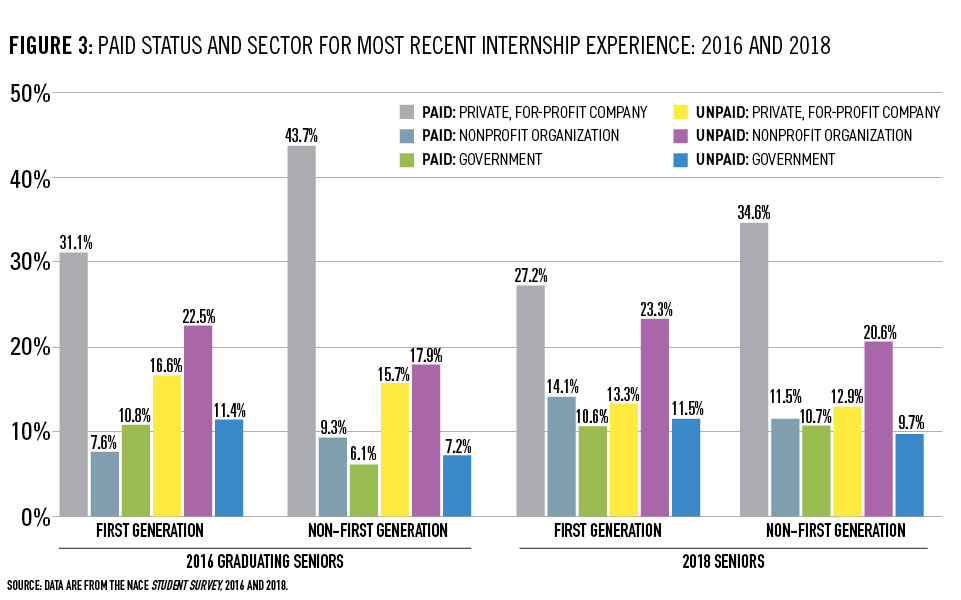
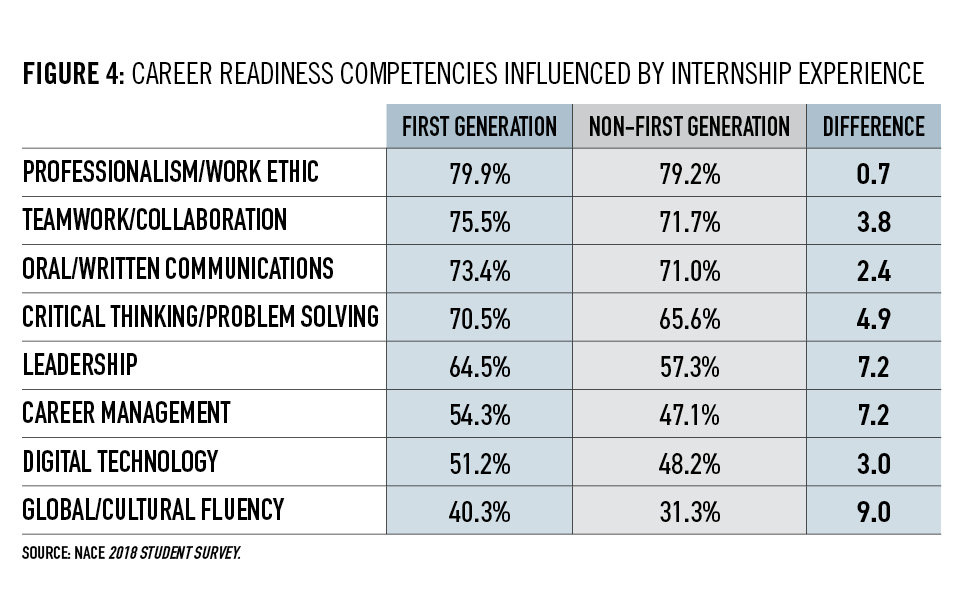
Study Abroad and First-Generation Students
The Glossari Project found that studying abroad added value to the academic achievements of students within its sample, which included FG students. According to results of the study, those students who studied abroad exceeded those who did not on functional knowledge, knowledge of world geography, knowledge of cultural relativism, and knowledge of global interdependence.
As was the case with internship participation, NFG students responding to the 2018 Student Survey were more likely to take part in study abroad than were FG students (9 percent versus 5.9 percent). Interestingly, however, those FG students who studied abroad were more likely to have multiple experiences than NFG students who took part in study aboard. (See Figure 5.)
The opportunity to experience a different culture was the primary motivator for both FG and NFG students who took part in study abroad, but more so for NFG students. FG students were much more likely than NFG students to identify the chance to experience different approaches to teaching and research as a motivator. (See Figure 6.)
What effects did study abroad have on the career readiness competencies of FG students? Did these differ from those of NFG students?
Overall, as Figure 7 illustrates, the study abroad experience had the greatest impact on how students from both groups perceived their competency in global/cultural fluency, followed by their view of their proficiency in the critical thinking competency. Except in the case of the global/cultural fluency and communications competencies, a greater portion of FG students reported their study abroad experience had a significant impact on their career readiness competencies than did NFG students. The biggest gaps between the two groups are in the digital technology, career management, and global/cultural fluency competencies—with more FGs citing gains in the digital technology and career management competencies and more NFGs citing gains in global/cultural fluency. Again, unfortunately, we do not know what drives those differences.
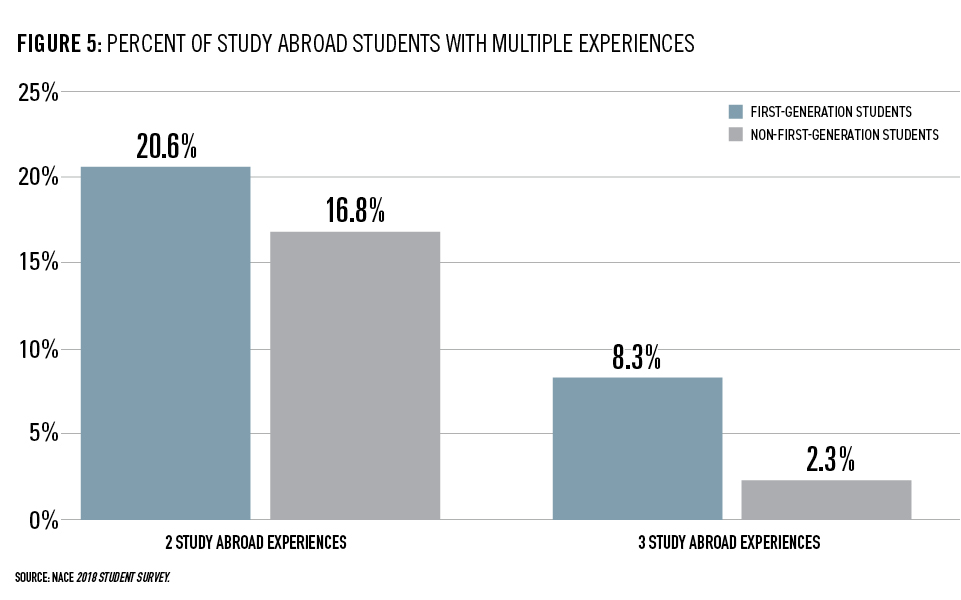
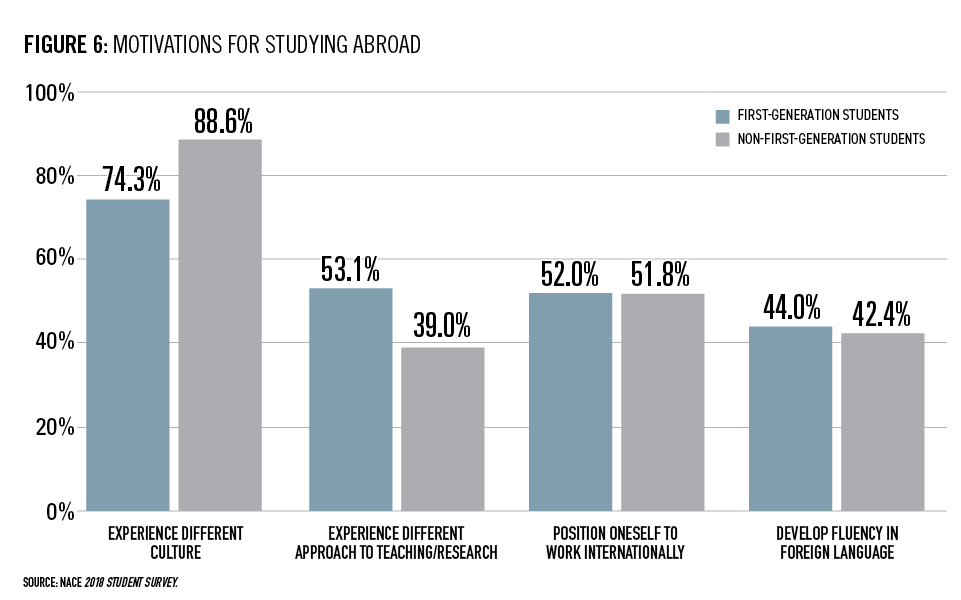
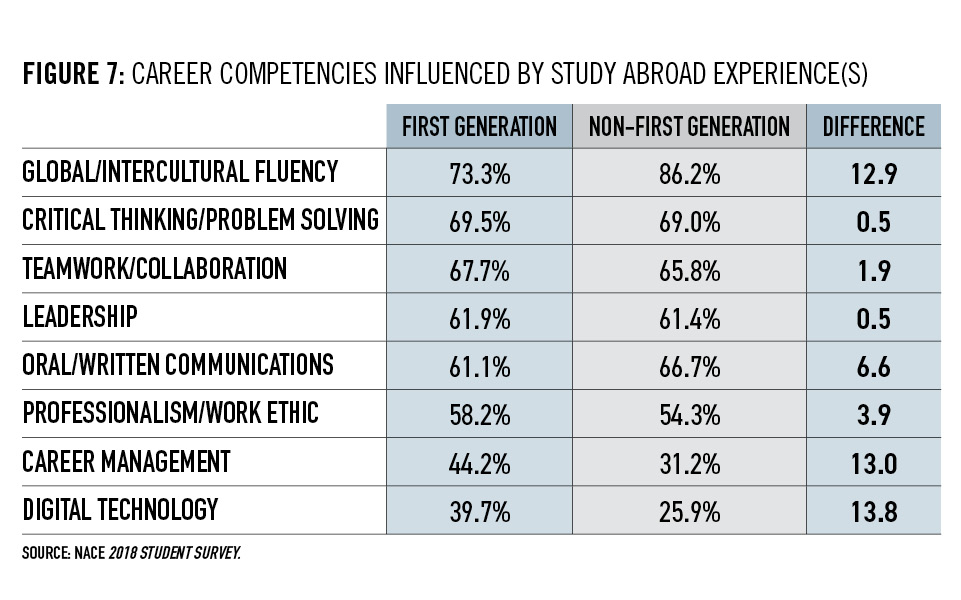
Next Steps: Further Research, Wider Participation
There is enough evidence offered through this analysis to suggest that internships and study abroad experiences positively impact FG students in their college experience. In fact, some of the evidence indicates that FG students may even benefit more than their NFG counterparts who engage in such experiences. This is especially true of the internship: It seems to pack a bigger “punch” for FG students.
Further research could be conducted to expand our understanding of how specific experiences and activities inform the career development of FG students. For example, additional work could be undertaken to examine how internships—paid and unpaid—affect outcomes for first-generation students in the short term as well as over a longer period of time. In the same vein, research could be undertaken to see how study abroad affects outcomes for FG students. Unfortunately, regardless of the positive impact of internships and study abroad, data indicate that FG students are less likely than their peers to take part in either, hampered, most likely, by financial constraints.
Recognizing that there is additional research that could be done, higher education could leverage current findings now to help first-generation students in their college experience and as they transition from college to career. In particular, a practical recommendation would be for schools to consider how to encourage more first-generation students to take part in internships. One way to achieve that would be by funding internships to relieve financial pressures that hold many first-generation students back
Endnotes
1 Redford, J., & Hoyer, K. M. (2017). First-generation and continuing-generation college students: A comparison of high school and postsecondary experiences. National Center for Education Statistics. Retrieved from https://nces.ed.gov/pubs2018/2018009.pdf
2 Cahalan, M., Perna, L. W., Yamashita, M., Wright, J., & Santillan, S. (2018). Indicators of higher education equity in the United States: 2018 historical trend report. Washington, DC: Pell Institute for the Study of Opportunity in Higher Education.
3 Furquim, F., Glasener, K.M., Oster, M., McCall, B.P., and DesJardins, S.L. (2017). Navigating the financial aid process: Borrowing outcomes among first-generation and non-first generation students. ANNALS of the American Academy of Political and Social Science, 671(1): 69–91.
4 DeAngelo, L., & Franke, R. (2016). Social mobility and reproduction for whom? College readiness and first-year retention. American Educational Research Journal, 53(6), 1588-1625. doi:10.3102/0002831216674805
5 Redford & Hoyer.
6 The 2016 Student Survey captured data from “graduating seniors,” i.e., those who would be graduating between July 1 and June 30. The 2018 version of the survey did not stipulate graduation date; consequently, “seniors” may include those who graduated after June 30, 2018.
Additional References
Finley, A., & McNair, T. (2013). Assessing underserved students' engagement in high-impact practices. Washington, DC: Association of American Colleges and Universities.
National Association of Colleges and Employers. First-generation students special report. February 2017.
Sutton, R. C., & Rubin, D. L. (2004). The GLOSSARI project: Initial findings from a system-wide research initiative on study abroad learning outcomes. Frontiers: The Interdisciplinary Journal of Study Abroad, 10, 65-82.







